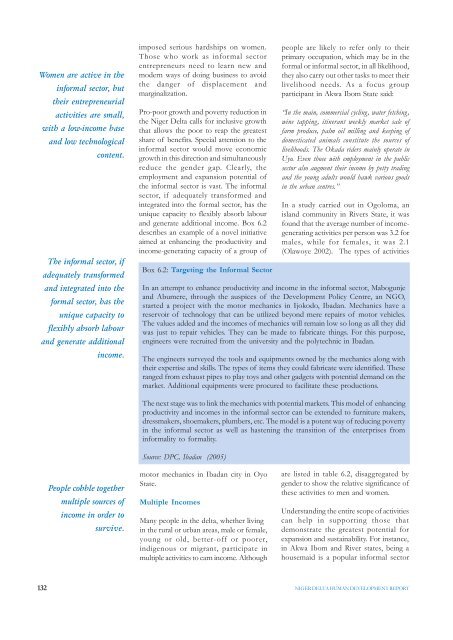Niger Delta Human Development Report - UNDP Nigeria - United ...
Niger Delta Human Development Report - UNDP Nigeria - United ...
Niger Delta Human Development Report - UNDP Nigeria - United ...
You also want an ePaper? Increase the reach of your titles
YUMPU automatically turns print PDFs into web optimized ePapers that Google loves.
Women are active in the<br />
informal sector, but<br />
their entrepreneurial<br />
activities are small,<br />
with a low-income base<br />
and low technological<br />
content.<br />
The informal sector, if<br />
adequately transformed<br />
and integrated into the<br />
formal sector, has the<br />
unique capacity to<br />
flexibly absorb labour<br />
and generate additional<br />
income.<br />
People cobble together<br />
multiple sources of<br />
income in order to<br />
survive.<br />
imposed serious hardships on women.<br />
Those who work as informal sector<br />
entrepreneurs need to learn new and<br />
modern ways of doing business to avoid<br />
the danger of displacement and<br />
marginalization.<br />
Pro-poor growth and poverty reduction in<br />
the <strong>Niger</strong> <strong>Delta</strong> calls for inclusive growth<br />
that allows the poor to reap the greatest<br />
share of benefits. Special attention to the<br />
informal sector would move economic<br />
growth in this direction and simultaneously<br />
reduce the gender gap. Clearly, the<br />
employment and expansion potential of<br />
the informal sector is vast. The informal<br />
sector, if adequately transformed and<br />
integrated into the formal sector, has the<br />
unique capacity to flexibly absorb labour<br />
and generate additional income. Box 6.2<br />
describes an example of a novel initiative<br />
aimed at enhancing the productivity and<br />
income-generating capacity of a group of<br />
Box 6.2: Targeting the Informal Sector<br />
motor mechanics in Ibadan city in Oyo<br />
State.<br />
Multiple Incomes<br />
Many people in the delta, whether living<br />
in the rural or urban areas, male or female,<br />
young or old, better-off or poorer,<br />
indigenous or migrant, participate in<br />
multiple activities to earn income. Although<br />
people are likely to refer only to their<br />
primary occupation, which may be in the<br />
formal or informal sector, in all likelihood,<br />
they also carry out other tasks to meet their<br />
livelihood needs. As a focus group<br />
participant in Akwa Ibom State said:<br />
“In the main, commercial cycling, water fetching,<br />
wine tapping, itinerant weekly market sale of<br />
farm produce, palm oil milling and keeping of<br />
domesticated animals constitute the sources of<br />
livelihoods. The Okada riders mainly operate in<br />
Uyo. Even those with employment in the public<br />
sector also augment their income by petty trading<br />
and the young adults would hawk various goods<br />
in the urban centres.”<br />
In a study carried out in Ogoloma, an<br />
island community in Rivers State, it was<br />
found that the average number of incomegenerating<br />
activities per person was 3.2 for<br />
males, while for females, it was 2.1<br />
(Olawoye 2002). The types of activities<br />
In an attempt to enhance productivity and income in the informal sector, Mabogunje<br />
and Abumere, through the auspices of the <strong>Development</strong> Policy Centre, an NGO,<br />
started a project with the motor mechanics in Ijokodo, Ibadan. Mechanics have a<br />
reservoir of technology that can be utilized beyond mere repairs of motor vehicles.<br />
The values added and the incomes of mechanics will remain low so long as all they did<br />
was just to repair vehicles. They can be made to fabricate things. For this purpose,<br />
engineers were recruited from the university and the polytechnic in Ibadan.<br />
The engineers surveyed the tools and equipments owned by the mechanics along with<br />
their expertise and skills. The types of items they could fabricate were identified. These<br />
ranged from exhaust pipes to play toys and other gadgets with potential demand on the<br />
market. Additional equipments were procured to facilitate these productions.<br />
The next stage was to link the mechanics with potential markets. This model of enhancing<br />
productivity and incomes in the informal sector can be extended to furniture makers,<br />
dressmakers, shoemakers, plumbers, etc. The model is a potent way of reducing poverty<br />
in the informal sector as well as hastening the transition of the enterprises from<br />
informality to formality.<br />
Source: DPC, Ibadan (2005)<br />
are listed in table 6.2, disaggregated by<br />
gender to show the relative significance of<br />
these activities to men and women.<br />
Understanding the entire scope of activities<br />
can help in supporting those that<br />
demonstrate the greatest potential for<br />
expansion and sustainability. For instance,<br />
in Akwa Ibom and River states, being a<br />
housemaid is a popular informal sector<br />
132 NIGER DELTA HUMAN DEVELOPMENT REPORT










